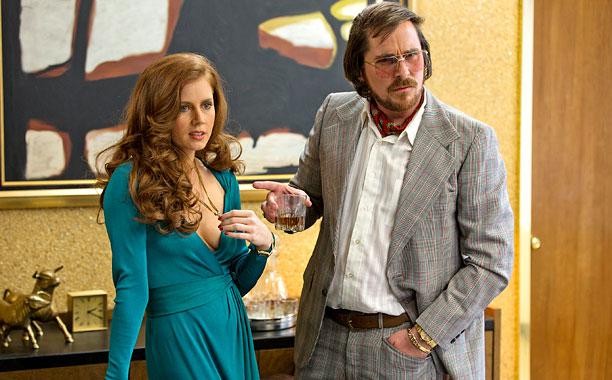Like many movies, American Hustle addresses its relationship to fact with a message that appears on screen before the action begins. But rather than the customary (and intentionally vague) “based on a true story,” the claim is more modest: “Some of this actually happened.”
A viewer may be surprised, then, to learn how much of the farfetched storyline is true. Spoilers follow.
The FBI really did enlist a career swindler from the Bronx who had been arrested for running scams to serve as the key player in an undercover operation. With the con artist leading the way, the Feds dangled the lure of a fictitious Arab sheikh named Abdul, who supposedly wanted to use his millions to buy things that can’t legally be bought—such as fast-track citizenship and approval to invest in new Atlantic City casinos. A number of public officials happily responded that, in exchange for cash, they would ensure that various official bodies did the sheikh’s bidding. The operation, revealed to great media fanfare in 1980, was called Abscam (for “Abdul scam”) and resulted in the conviction of 19 people, including the mayor of Camden, N.J., six U.S. congressmen, and a U.S. senator, Harrison A. Williams of New Jersey. It was the largest bribery scandal in the history of Congress.
The most complete account of Abscam is The Sting Man, written by the longtime Newsday journalist Robert W. Greene in close cooperation with the con artist himself, real name Melvin Weinberg. The film is based to some degree on the book.
So which events in the movie actually happened? And how closely are the characters modeled on real people? What follows is a breakdown of fact and fiction, based primarily on news accounts and Greene’s book.
Mel Weinberg and Irving Rosenfeld (Christian Bale)
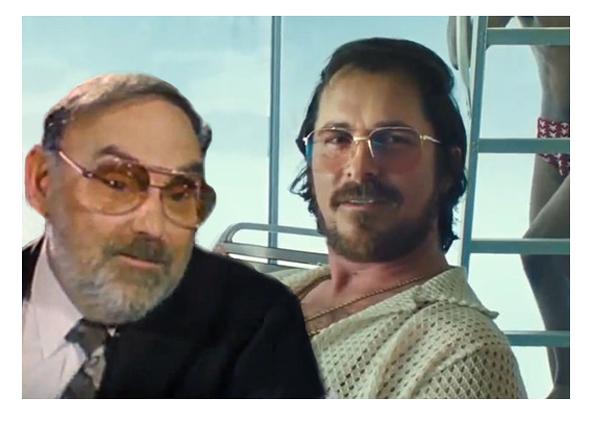
’60 Minutes’ clip on YouTube; Columbia Pictures
Rosenfeld is based on Mel Weinberg, who did in fact start out as an owner of dry-cleaning and glass-installation businesses. (Yes, he really smashed windows to drum up demand.) Like Rosenfeld, Weinberg soon moved on to front-end scams, whose general strategy will be familiar if you’ve ever replied to an email from a stranger overseas: I’ve got big money for you if you pay me small money first. Using the name London Investors, Weinberg opened a lavish office and cultivated an air of exclusivity and legitimacy with the help of his mistress. (He told customers they could reach him and his associates in international capitals at fancy hotels—which happened to be the ones that would accept phone messages without indicating whether anyone of that name was registered there.) Targeting clients desperate for loans they couldn’t get otherwise, he would offer to help them secure one for a nonrefundable upfront fee, and you know the rest.
Weinberg, like Rosenfeld, grew nervous when Abscam began to implicate not just public officials but the mob. The dirty middle men who offered to secure approval for casino licenses on the sheikh’s behalf gradually revealed that the mob was coming to control the gambling business in Atlantic City, as it had in Las Vegas. Weinberg did not savor the notion of testifying against the Mafia. But the investigation did not result in indictments for any organized-crime figures—and none of those mobsters, so far as I can tell, knew Arabic, as one does in the film. Weinberg was able to show his face in the Abscam trials as the star witness. He is alive, resides in Florida, and is nearing his 90th birthday.
Evelyn Knight and Sydney Prosser (Amy Adams)
American Hustle’s version of Weinberg’s mistress is named Sydney Prosser and played by Amy Adams; her story in the movie diverges further from historical fact. Weinberg’s girlfriend, Evelyn Knight, played a bit part in his scams—she was not a full partner. And she didn’t impersonate a well-born Englishwoman; she was actually English. She really was threatened with prosecution when Weinberg was busted; he pled guilty to save her. He was sentenced to prison before being approached by the FBI to lend his expertise in sleaze.
Evelyn did not actually participate in Abscam, and history does not record any love triangle that left her caught in the middle between Weinberg and an FBI agent on the Abscam team.
Richie DiMaso (Bradley Cooper) and Tony Amoroso
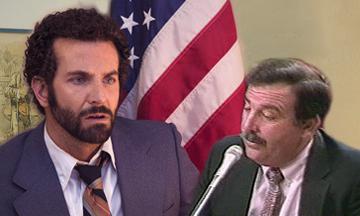
Columbia Pictures; CSPAN
Cooper’s undercover agent and his supervisor do not have direct real-life counterparts, but they do reflect a composite of the various Federal officials Weinberg worked with. Some were too tightfisted and square for Weinberg’s taste; others were clumsy at playing undercover roles (there were actually two fictitious sheikhs, but one agent muffed his impersonation and was promptly shelved). A few officials, like DiMaso in the film, pushed to give Weinberg and the investigation a freer hand. No one was quite so aggressive as DiMaso is—though the closest analog would be the similarly named Tony Amoroso, who impressed Weinberg with his toughness and foul mouth. Amoroso, like DiMaso, was present for filmed payoffs that sealed the sting operation, and he reportedly served as a consultant on American Hustle.
Carmine Polito (Jeremy Renner) and Angelo Errichetti
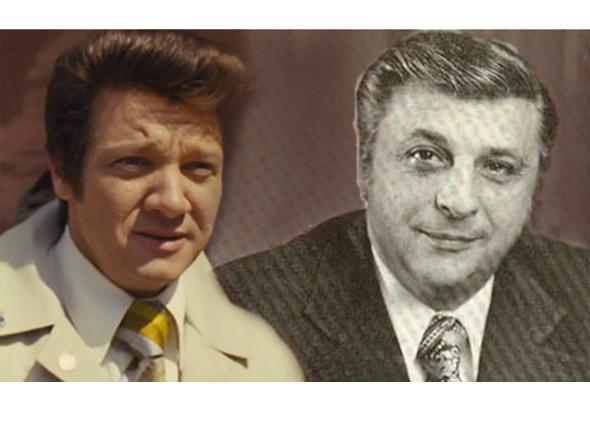
Columbia Pictures; Vimeo
The film cultivates some sympathy for the mayor of Camden, N.J., played by Jeremy Renner and fairly closely modeled on real-life mayor Angelo Errichetti, who died earlier this year, at 84. American Hustle portrays him as a man of the people (that part is true) who only hoped his illegal maneuvers would create jobs and prosperity in the state. That latter bit is a stretch, as Errichetti was arguably guilty of more outrageous and greedy conduct than anyone else. This did not dissuade Mel Weinberg from developing a certain fondness for the guy, as Rosenfeld does in the movie. It is a flight of Hollywood fancy, though, that Weinberg sought to give Errichetti immunity and dupe the Feds.
The Sheikh
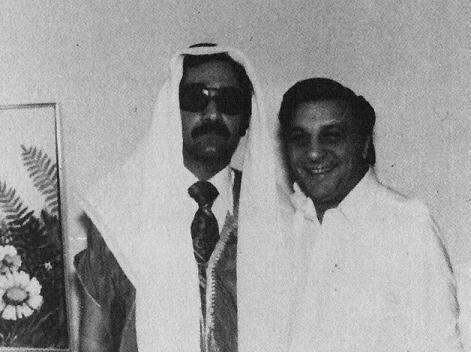
The “sheikh” poses with Angelo Errichetti
FBI photo
One of Abscam’s more outlandish chapters is not depicted in the movie: At one point, Weinberg invited some politicians and a cornucopia of hustlers and low-lifes to take a party cruise on a power yacht in Florida allegedly owned by one of the sheikhs but actually the property of the FBI. On the yacht, several political figures actually posed for photos with the phony sheikh, played by a Lebanese-born FBI agent (who had much better Arabic than the agent of Mexican descent we meet in the movie). In a great twist, Weinberg got around the FBI’s tight budget by elaborately smooth-talking guests into supplying the liquor, food, and cash that made the party an enticing attraction in the first place.
In one scene in the film, the alleged sheikh (played by Michael Peña) gives the mayor of Camden a knife that supposedly has great symbolic significance; later the fallen mayor guesses that the knife was a mere toy. The ceremonial knife did indeed change hands, and Weinberg had retrieved it from a box in his cellar, having bought it as a souvenir at a flea market in Athens, for $2.75.
The Payoffs
In the movie, the payoffs to politicians, captured on video, occur rapid-fire at the Plaza Hotel. Though Abscam did use the Plaza to impress marks, the filmed payoffs occurred at several less impressive hotels and, most often, at a townhouse at 4407 W Street in Washington, D.C. (The FBI had rented the townhouse from a Washington Post reporter temporarily posted elsewhere; the reporter had no idea of the story he was missing, nor even the true identity of his tenant.) Video recordings of these bribes eventually went public and became enduring symbols of public corruption. In the most egregious tape, Rep. Michael “Ozzie” Myers takes $50,000 and says, “You’re going about this the right way … Money talks in this business and bullshit walks.”
The Aftermath
Abscam had some interesting postscripts that don’t get aired in the movie. A debate that became central to the trial outlasted the case: Had the targets been entrapped? Didn’t Weinberg put words in Senator Williams’s mouth on that one tape? Apart from trying to impeach Weinberg’s character, crying entrapment was just about the only defense that anyone could muster given the hard evidence. The Justice Department ended up overhauling the rules for undercover work to clarify what constitutes fair play.
Some politicians who never took payoffs but were alleged to have been amenable to it had to answer tough questions thereafter, in some cases for years. The legendary Pennsylvania Congressman John Murtha had a lengthy meeting on tape in the D.C. Townhouse, during which he said in response to an offer of money, “I’m not interested … at this point.” The episode dogged him and made appearances in obituaries when he died in 2010.

YouTube; Columbia Pictures
In a strange and sad note, Weinberg’s wife, whose rivalry with the mistress was more prosaic than the heated showdown depicted in the movie, came forward in 1982 to claim that Weinberg had accepted gifts and cash from targets of the investigation. Weinberg had denied this charge on the stand. On ABC’s 20/20, she supplied some suggestive evidence that the microwave oven they owned was not a purchase of Weinberg’s as he claimed, but a gift from an Abscam mark. (The movie has the Camden mayor giving it to him.) One week after that episode aired, Marie Weinberg was found dead, of an apparent suicide.
